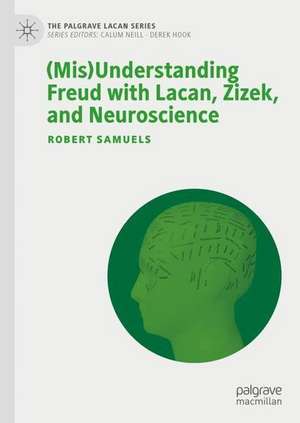(Mis)Understanding Freud with Lacan, Zizek, and Neuroscience: The Palgrave Lacan Series
Autor Robert Samuelsen Limba Engleză Hardback – 18 oct 2022
| Toate formatele și edițiile | Preț | Express |
|---|---|---|
| Paperback (1) | 623.65 lei 6-8 săpt. | |
| Springer International Publishing – 19 oct 2023 | 623.65 lei 6-8 săpt. | |
| Hardback (1) | 628.95 lei 6-8 săpt. | |
| Springer International Publishing – 18 oct 2022 | 628.95 lei 6-8 săpt. |
Din seria The Palgrave Lacan Series
-
 Preț: 356.57 lei
Preț: 356.57 lei - 20%
 Preț: 628.09 lei
Preț: 628.09 lei - 18%
 Preț: 927.95 lei
Preț: 927.95 lei - 18%
 Preț: 765.81 lei
Preț: 765.81 lei - 15%
 Preț: 686.22 lei
Preț: 686.22 lei - 18%
 Preț: 868.23 lei
Preț: 868.23 lei - 5%
 Preț: 1137.99 lei
Preț: 1137.99 lei - 18%
 Preț: 765.50 lei
Preț: 765.50 lei - 18%
 Preț: 716.76 lei
Preț: 716.76 lei -
 Preț: 312.01 lei
Preț: 312.01 lei - 18%
 Preț: 770.46 lei
Preț: 770.46 lei - 18%
 Preț: 765.95 lei
Preț: 765.95 lei - 18%
 Preț: 870.54 lei
Preț: 870.54 lei - 15%
 Preț: 577.51 lei
Preț: 577.51 lei - 18%
 Preț: 768.44 lei
Preț: 768.44 lei - 18%
 Preț: 717.73 lei
Preț: 717.73 lei - 15%
 Preț: 625.10 lei
Preț: 625.10 lei - 15%
 Preț: 570.74 lei
Preț: 570.74 lei - 5%
 Preț: 761.21 lei
Preț: 761.21 lei - 18%
 Preț: 714.61 lei
Preț: 714.61 lei - 5%
 Preț: 1017.36 lei
Preț: 1017.36 lei -
 Preț: 474.27 lei
Preț: 474.27 lei - 15%
 Preț: 569.77 lei
Preț: 569.77 lei - 18%
 Preț: 713.99 lei
Preț: 713.99 lei - 15%
 Preț: 681.72 lei
Preț: 681.72 lei - 15%
 Preț: 577.51 lei
Preț: 577.51 lei - 18%
 Preț: 772.49 lei
Preț: 772.49 lei - 18%
 Preț: 878.45 lei
Preț: 878.45 lei - 15%
 Preț: 576.68 lei
Preț: 576.68 lei -
 Preț: 441.24 lei
Preț: 441.24 lei - 5%
 Preț: 639.50 lei
Preț: 639.50 lei
Preț: 628.95 lei
Preț vechi: 739.95 lei
-15% Nou
Puncte Express: 943
Preț estimativ în valută:
120.37€ • 125.71$ • 99.80£
120.37€ • 125.71$ • 99.80£
Carte tipărită la comandă
Livrare economică 11-25 februarie 25
Preluare comenzi: 021 569.72.76
Specificații
ISBN-13: 9783031133268
ISBN-10: 3031133269
Pagini: 196
Ilustrații: VII, 196 p.
Dimensiuni: 148 x 210 mm
Greutate: 0.4 kg
Ediția:1st ed. 2022
Editura: Springer International Publishing
Colecția Palgrave Macmillan
Seria The Palgrave Lacan Series
Locul publicării:Cham, Switzerland
ISBN-10: 3031133269
Pagini: 196
Ilustrații: VII, 196 p.
Dimensiuni: 148 x 210 mm
Greutate: 0.4 kg
Ediția:1st ed. 2022
Editura: Springer International Publishing
Colecția Palgrave Macmillan
Seria The Palgrave Lacan Series
Locul publicării:Cham, Switzerland
Cuprins
Chapter 1. Introduction.- Chapter 2. Freud’s Project.- Chapter 3. Neuroscience and the Repression of Psychoanalysis.- Chapter 4. Moving from Freud’s Five Principles to Lacan’s Four Fundamental Concepts.- Chapter 5. The Desire of the Analyst and the American Repression of Psychoanalysis.-
Chapter 6. Zizek and the Empty Unconscious.- Chapter 7. Misunderstanding Psychoanalysis from the Left.- Chapter 8. Conclusion: Still (Mis)Understanding Psychoanalysis.
Notă biografică
Robert Samuels is Lecturer in Advanced Writing at the University of California, Santa Barbara, USA. He holds doctorates in Psychoanalysis and English. He is the author of 14 books, including Psychoanalyzing the Politics of the New Brain Sciences (2017).
Textul de pe ultima copertă
This book sets out to clarify five key Freudian concepts (the pleasure principle, the primary processes, the unconscious, transference, and the reality principle) elaborated early on in Freud’s work but, it is argued, rarely understood—even by psychoanalysts themselves. It examines in turn the post-Freudian paradigms employed in neuropsychoanalysis, Lacan, Zizek, object relations, and psychoanalytic approaches to identity politics, and in doing so reveals the extent to which they have been distorted and repressed in these new contexts. Over the course of the book the author demonstrates how Freud’s unpublished Project for a Scientific Psychology can be seen as a complete system of core concepts that both ground psychoanalysis in neurology and also introduce a vital challenge to the brain sciences. This book will appeal to students and scholars of psychoanalysis, clinical psychology, and psychoanalytic theory.
Robert Samuels is Lecturer in Advanced Writing at the University of California, Santa Barbara, USA. He holds doctorates in Psychoanalysis and English. He is the author of 14 books, including Psychoanalyzing the Politics of the New Brain Sciences (2017).
Caracteristici
Argues that psychoanalytic theory and practice is structured by five threshold concepts Examines post-Freudian paradigms employed in neuropsychoanalysis, Lacan, Zizek and identity politics Demonstrates how Freud both grounds psychoanalysis in neurology and challenges the brain sciences
